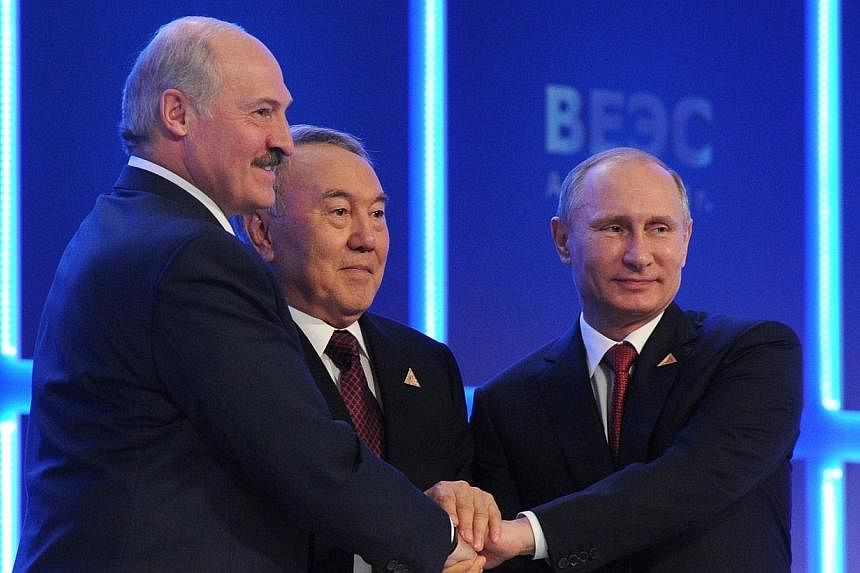ASTANA, Kazakhstan (REUTERS) - Russian President Vladimir Putin signed a treaty with Kazakhstan and Belarus on Thursday creating a vast trading bloc which he hopes will challenge the economic might of the United States, the European Union and China.
Mr Putin denies the forging of the Eurasian Economic Union with two other former Soviet republics, coupled with Russia's annexation of Crimea from Ukraine, means he wants to rebuild a post-communist Soviet Union or as much of it as he can.
He does, however, intend the alliance, with a market of 170 million people, a combined annual GDP of US$2.7 trillion (S$ 3.3 trillion) and vast energy riches, to demonstrate that Western sanctions imposed over the crisis in Ukraine will not isolate Russia.
But the world's major economic powers may not be quaking in their boots.
Ukraine has snubbed the union, other ex-Soviet states are wary of joining a body that could give Moscow leverage over them again and Kazakhstan fiercely defended its sovereignty during negotiations, forcing Mr Putin to water down his ambitions.
"Our meeting today of course has a special and, without exaggeration, an epoch-making significance," Mr Putin said of the treaty, signed to loud applause from rows of seated officials in the modern Kazakh capital, Astana.
"This document brings our countries to a new stage of integration while fully preserving the states' sovereignty."
Kazakh President Nursultan Nazarbayev, seated at a long white table at which he, Mr Putin and Belarussian President Alexander Lukashenko signed the treaty, said he envisaged the new union as being a major competitive force. "The main mission of our union in the first half of the 21st century is ... first, to gain a natural competitive advantage as an economic bridge between the East and the West, between Europe and Asia," he said.
The Eurasian Economic Union will formally come into force on Jan. 1, once it has passed the formality of being approved by the three former Soviet republics' parliaments.
The union - an idea first raised by Nazarbayev in 1994 but widely ignored at the time - brings to life Putin's dream of uniting like-minded countries, capitalising on the nostalgia of many Russians for the order and relative economic and political stability of the communist Soviet empire that collapsed in 1991.
After 14 years in power, he sees its creation as a personal political legacy for when he eventually steps aside and it has become one of the "big ideas" of his third term as president.
The treaty deepens ties forged when the three countries took the initial step of creating a customs union in 2010 and guarantees the free transit of goods, services, capital and workforce and coordinates policy for major economic sectors.

